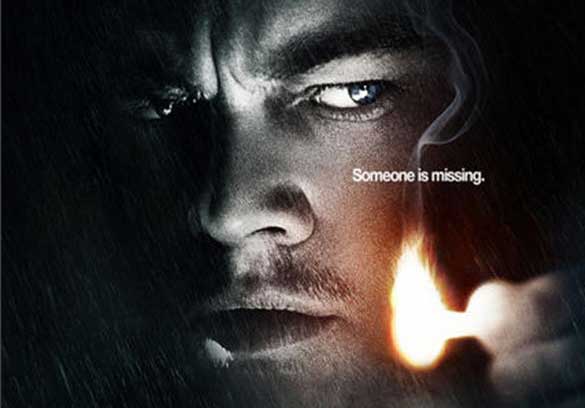Teddy Daniels (Leonardo DiCaprio) is a U.S. Marshal sent to investigate a missing inmate from the shady Shutter Island mental institution. Nestled on ragged cliffs and in total isolation, the hospital is wrapped in a strange, hushed silence, holding back its secrets from the prying eyes of the outsider. But as Daniels unlocks the dark tales of the criminally insane, we begin to realize the blackness in the Marshal’s own past. A storm is coming, and before it has passed, years of hidden secrets will be brought to light, and the sane world will be torn asunder. This is the source of the breach; this is “Shutter Island.”
There are no words for the sheer beauty of this film. The sweeping aerial shots, the brief glimpses into each inmate’s cell, the slow scan across a lush, green courtyard crippled by the thrashing wind. Everything is unique, meaningful and utterly gorgeous. Director of photography Robert Richardson (“Inglourious Basterds,” “Natural Born Killers”) reveals the scope of Shutter Island expertly.
But this is not just another pretty film; every shot is well placed, reflective and purposeful. Director Martin Scorsese’s visual instinct drives the photography as much as Richardson beautifully embellishes it. From the opening shot of a ship floating out of fog to the shadowy innards of the mental institution, the photography propels the story forward. A compelling narrative can do wonders for a movie, but it takes total directorial honesty and foresight to draw out that movement and place it in front of the camera lens. Scorsese brings this integrity skillfully, even easily, to the screen and it is no surprise considering his massive cinematic repertoire (“The Departed,” ”The Aviator,” “The Last Temptation of Christ,” “Raging Bull,” etc.)
Although the writing is not particularly stellar, it certainly holds its own and much care is placed in the details of the twist and the payoff is wonderful. Subtle descriptions hidden in the shadows come brilliantly to light as the islands secrets slowly unravel. However, the real strength of this script lies in the journey. Screenwriter Laeta Kalogridis keeps the audience engaged throughout with haunting moments, clever reveals and interesting back stories.
The acting in this film, as with any number of Scorsese films, is simply superb. With actors like Leonardo DiCaprio, Ben Kingsley, Max von Sydow, Emily Mortimer and Michelle Williams under an expert director it is hard to go wrong. Oddly, the actors all perform with somewhat scripted, underhanded mannerisms.
Many of the side characters even recite their lines with arms pinned to their sides or in their laps like guilty children. However, this is the intention for those characters all along as each character is playing his or her part in some greater conspiracy. And as DiCaprio’s character discovers the dark history of the Shutter Island asylum, we begin to uncover enigmas in his own life and slowly find that our hero cannot escape the harrowing events of his own past. These flattened performances are very intentional, adding to the high stakes of survival on this increasingly treacherous island.
The music for this film is the most evocative use of a modern classical score I’ve heard since “There Will Be Blood.” Through repetition and layering, simple instrument lines build together and thrust already potent scenes into awe-inspiring glory. The island’s gaited bass theme leaps up and subsides, growing stronger and stronger with each resounding stride. The dream scenes swell with an airy, trembling tone that uniquely supplements their mercurial subjects. The music is just as integral as the cinematography and direction to making this film experience unforgettable.
As perfect as this film is, however, there are elements to dislike. For one, the opening five minutes are terribly, horrendously expository. The audience is force-fed enough information to make an encyclopedia sick. Line after line of dialogue is delivered with no ostensible reason than to inform the disinterested audience under the thin veil of enlightening Daneils’ new partner (Mark Ruffalo). Of all the better solutions for exposition at writer Kalogridis’ disposal, she chose this?
The editing for “Shutter Island” is also quite out of place. Some scenes just do not cut together well at all. Continuity errors that a good editor would have caught are left unnoticed. But what is really interesting about these is that some of the “errors” appear completely deliberate. For example, in one shot, a woman is given a glass of water to drink. The shot cuts to a close-up of the woman drinking, and now there is no glass in her hand (watch carefully for this, or you may miss it). We cut back to the table, where she slams her hand down, and the empty glass is now firmly in her grasp. This was no accident.
Scorsese wants to mess with his audience’s mind, to drag us into the asylum and make us question our own sanity. This proves very clever in the example of the absent glass, but do these examples excuse the larger editing flaws? Perhaps interviews with Scorsese and his editor, Thelma Schoonmaker, will reveal how intentional this uncanny editing was. Until then, we can either conspire of some greater, inspired metaphor on the fickleness of appearances or assume negligence on the part of the post-production team.
In the end, “Shutter Island” is a delightful, intoxicating film. Fueled by powerful visuals, moving performances and masterful storytelling, there is little this movie does not give its viewers. There are certainly holes to gawk at, but the sheer force that drives this story topples any barriers that stand against it. This is a compelling film, one that you positively must see once, and one you will more than likely want to see twice.







